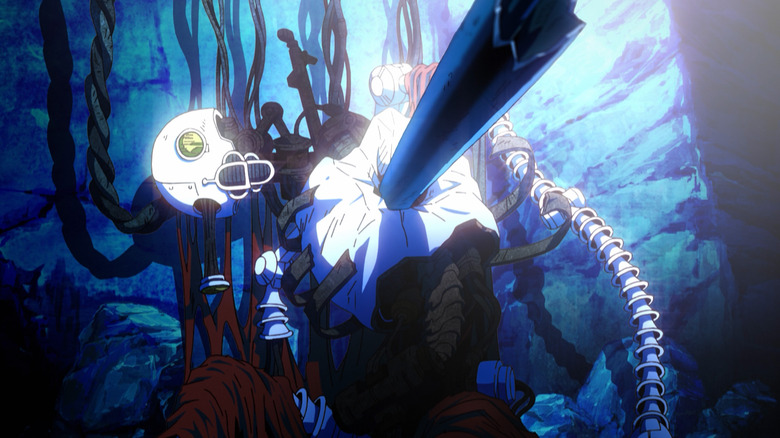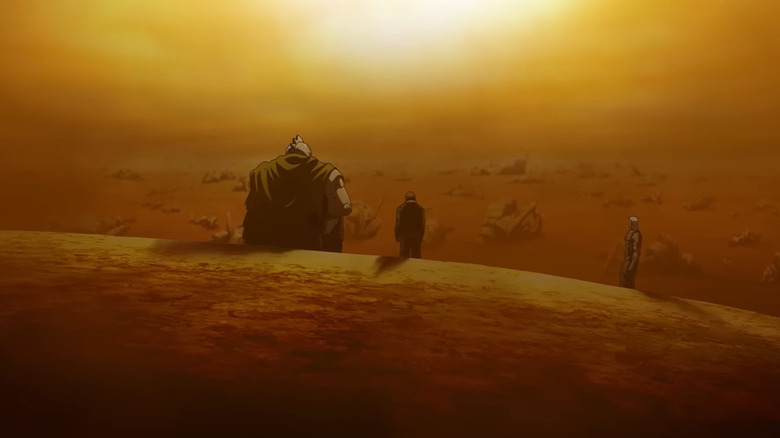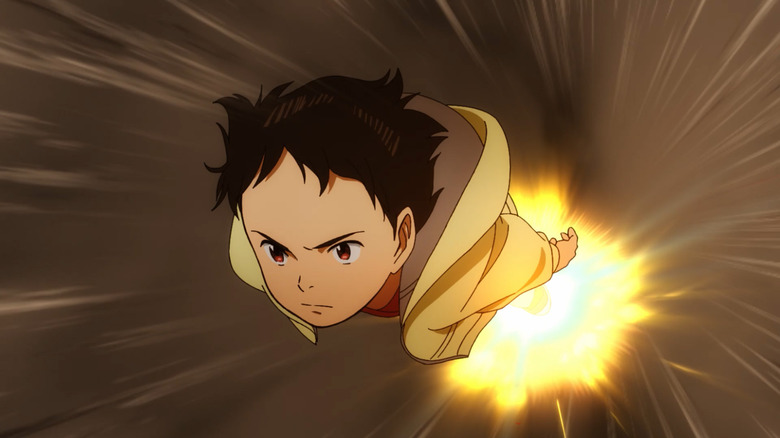Pluto Is A Thought-Provoking Sci-Fi Epic And A Masterclass In Reimagining Iconic Franchises
(Welcome to Ani-time Ani-where, a regular column dedicated to helping the uninitiated understand and appreciate the world of anime.)
Listen, I love anime and the endless possibilities of the medium. Unfortunately, much like how Hollywood is mostly inundated by uncomplicated four-quadrant blockbusters that get tiring after a while, anime, too, is inundated with uncomplicated action-centric titles that cater to a mass audience. There's a reason the vast majority of anime shows are about teenagers, which is fine but it means that anytime a show comes out that deals with adult characters and mature themes it is worth paying attention to.
So imagine how thrilled I was to find out that there was an anime adaptation of a manga by the guy who gave us the anime equivalent of an HBO prestige drama — and it is based on a story by the man who created anime as we know it.
That anime is "Pluto." Adapted from the Naoki Urasawa manga of the same name, the story is a reinterpretation of "The Greatest Robot on Earth" story arc from the "Astro Boy" manga by legendary author and animator Osamu Tezuka. In his review, our own Devin Meenan described the show as a spiritual companion to an Alan Moore masterpiece. "What Alan Moore and Dave Gibbons did with 'Watchmen,' Urasawa and Nagasaki do with 'Pluto.'" Not only are both stories murder mysteries, but both "take comic characters of old and reimagine them through their artistic lens."
"Pluto" reimagines the world of "Astro Boy" as a hard-boiled crime thriller about a robot detective investigating the murders of the world's strongest robots. From there, the anime becomes a thought-provoking sci-fi epic, and the best Netflix anime since "Devilman Crybaby."
What makes it great
"Pluto" is a masterclass in how to adapt and reimagine popular franchises for a new generation. Ever since the story arc was first published in the 1952 "Astro Boy" manga, it has been re-adapted three times, each with small and subtle differences.
Rather than follow in the same footsteps and make this another family-friendly superhero saga, "Pluto" radically changes the tone and reinvents the arc as a mature detective story — as if Disney let David Lynch remake one of their classic animated movies as a prestige Showtime limited series. Indeed, much like with "Monster," this anime is presented in a cinematic way. From the sharp, naturalist dialogue to the realism in the visuals (particularly the character animation) and even the deliberate pacing gives "Pluto" a feeling of auteur filmmaking that is uncommon in modern anime shows. Like "Monster," a lot is owed to the realism of the character designs, which feature characters of all shapes and sizes.
Each of the eight episodes of "Pluto" is an hour long. The length allows each episode to cover a rather vast amount of story. Take the first episode, in which we first meet the robot detective, learn about the case and its importance, and are introduced to a very Hannibal Lecter-esque killer robot, all before we cut to a story of a blind composer who refuses to think a robot could play music with real emotion. Much like "Monster," this anime excels at making each character feel alive and important. Though there is very much a main story, we get to know each of the strongest robots, the people around them, their struggles, and dreams. There is at least one tear-inducing moment in each of the episodes, which makes the robots appear more human than even the human characters.
What it adds to the conversation
Much like Urasawa's "Monster," one of the biggest themes in "Pluto" is the question of what drives someone toward evil, whether it is inherent in us or learned. That question permeates every aspect of "Pluto," the detective tale, the war flashbacks, and even the tale of Astro himself.
As a story about robots and AI, Isaac Asimov himself would be proud of "Pluto." Whether robots have real emotions is a theme that comes up again and again in the anime, as is the notion of AI being truly perfect only when they reflect not just the good of humans, but the bad. Indeed, "Pluto" does at times become somewhat of a "Silence of the Lambs" tale, with the first robot to murder a human aiding in the investigation. Several characters in "Pluto" argue that the robot was the first truly perfect AI, as it could feel the most intrinsically human emotion there is — hate. The question of hate and AI is present in Pluto himself, here depicted as a confused and frightened creature reconciling his purpose and his own desires.
This same question is also present in the anime's themes of war. Where most anime shy away from portraying real-world comparisons, this one makes no effort to hide its Iraq War parallels. In "Pluto," there is a lot of talk about a recent war wherein the United States of Thracia invaded the Kingdom of Persia because they claimed that Persia was hiding robots of mass destruction — adding to the lack of subtlety, Persia's ruler is a character with an eerie resemblance to Saddam Hussein. Throughout the story, the robots and humans involved in the war are plagued by their actions, and the show even portrays the prejudice and discrimination against those who oppose war.
Why non-anime fans should check it out
Are you tired of safe and boring Disney remakes of their own animated movies? Do you wish someone would come up with a better idea than just turning every beloved public domain character into a slasher film? "Pluto" may be the show for you.
What can best be described as anime "Blade Runner" meets "Silence of the Lambs," all wrapped up in the world of "Astro Boy," studio M2's adaptation of "Pluto" is a stone-cold masterpiece and a masterclass in how to reimagine beloved characters and franchises. This is a mature, thought-provoking anime with an emotionally heavy story, thrilling action, and a gripping mystery.
What's more, you don't need any knowledge of "Astro Boy" to understand the story or appreciate what a big deal Atom is in the show's world. Like the best fictional universes, "Pluto" throws you into the middle chapter of a story, giving you enough details about its world to understand that there is more that happened before and more that happens after we cut to credits. But when the final credits roll, it wraps up one of the best standalone stories told in an anime show.
Watch This If You Like: "Blade Runner," "Silence of the Lambs," "A.I. Artificial Intelligence."
"Pluto" is streaming on Netflix.



